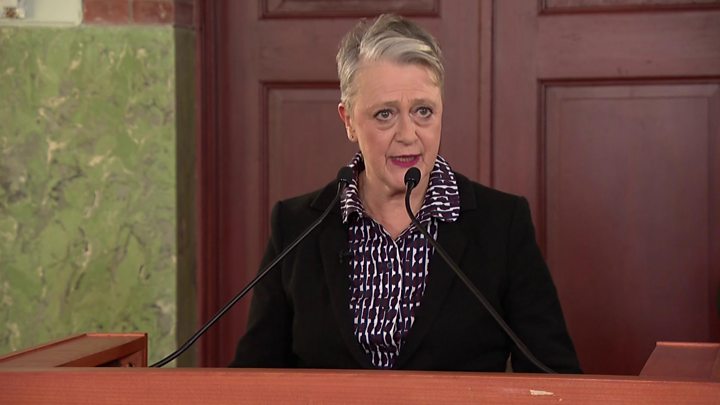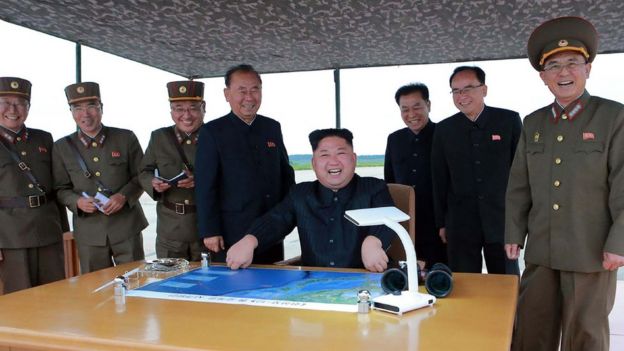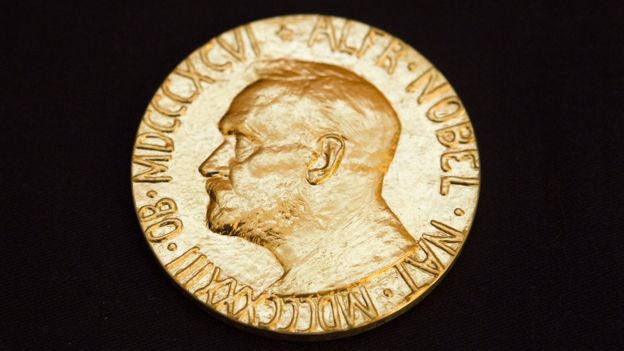
ICAN awarded Nobel Peace Prize
Posted: 6th October 2017
Anti-nuclear weapons group ICAN wins Nobel Peace Prize

The Nobel Peace Prize has been awarded to the International Campaign to Abolish Nuclear Weapons (Ican).
Berit Reiss-Andersen, the Nobel committee chair, said it was due to the group’s “groundbreaking efforts to achieve a treaty prohibition” on nuclear weapons.
“We live in a world where the risk of nuclear weapons being used is greater than it has been for a long time,” she continued.
She cited the North Korea issue.
- North Korea-US tensions: How worried should you be?
- Why are Nobel laureates getting older?
- Winners throughout the years
In July, after pressure from Ican, 122 nations backed a UN treaty designed to ban and eventually eliminate all nuclear weapons. But none of the nine known nuclear powers in the world – including the UK and the US – endorsed it.
Ms Reiss-Andersen called on nuclear-armed states to initiate negotiations to gradually eliminate the weapons.
Ican, a coalition of hundreds of non-governmental organisations (NGOs), is 10 years old and is based in Geneva, Switzerland. The group will receive nine million Swedish kronor ($1.1 million, £846,000) along with a medal and a diploma at a ceremony in December.
Beatrice Fihn, executive director of the group, told reporters that the prize had come as a surprise but that it was “a huge signal” that the group’s work was “needed and appreciated”.
“The laws of war say that we can’t target civilians. Nuclear weapons are meant to target civilians; they’re meant to wipe out entire cities,” she said, adding: “That’s unacceptable and nuclear weapons no longer get an excuse.
“It’s a giant radioactive bomb, it just causes chaos and havoc and civilian casualties. It is not a weapon that you can use in line with the laws of war.
“Every state matters here. The more states that sign and ratify this treaty the stronger the norm is going to get. They’re not moving towards disarmament fast enough.”
 Image copyrightAFP
Image copyrightAFPThe Nobel prize citation read: “Some states are modernising their nuclear arsenals, and there is a real danger that more countries will try to procure nuclear weapons, as exemplified by North Korea.”
North Korean leader Kim Jong-un has launched a series of rockets and a nuclear test this year, leading to an escalating war of words with US President Donald Trump.
Mr Trump, who commands one of the world’s most powerful nuclear arsenals, threatened to “totally destroy” North Korea if his country is forced to defend itself or its allies.
Last year’s winner, Colombian President Juan Manuel Santos, said the peace prize was “like a gift from heaven” as his government tried to negotiate a deal with the main rebel group, the Farc.
The alternative approach to nuclear weapons
Analysis by the BBC’s Jonathan Marcus
The Nobel Committee’s decision provides a powerful and timely reinforcement of the opprobrium and concern attached to nuclear weapons.
It comes at a moment when North Korea is actively developing its nuclear programme, the fate of the Iran nuclear deal is in the balance, and the US and Russia are both actively seeking to modernise their nuclear forces.
There is of course already the Non-Proliferation Treaty under which most countries agreed never to develop nuclear weapons and those that already had them agreed progressively to disarm.
But campaigners have long been unsatisfied with this process insisting that the nuclear “haves” have no intention of giving up their arsenals. So ICAN set about an alternative approach – to raise popular awareness of the issue and to pressure governments to open up a new treaty for signature earlier this year that would seek an outright ban on nuclear weapons.
Who are Ican?
- a coalition group supported by hundreds of non-governmental organisations (NGOs) in over 100 countries across the world
- formed in 2007, inspired by a similar campaign to ban the use of landmines worldwide
- supporters include actor Michael Sheen, artist Ai Weiwei and former UN Secretary-General Ban Ki-moon
- its lobbying encouraged the UN to adopt the Treaty on the Prohibition of Nuclear Weapons earlier this year which has been signed by 53 countries so far
How the prize is decided
 Image copyrightGETTY IMAGES
Image copyrightGETTY IMAGES- Eligible nominators from around the world can put forward candidates up to 1 February of the award year, while Nobel Committee members have more time
- All nominations are reviewed by the committee – whose five members are chosen by the Norwegian parliament – before a shortlist of 20-30 candidates are selected
- A group of Norwegian and international advisers write individual reports on the shortlisted candidates. Using these and further reports, the committee narrows the selection down to a handful
- A decision is reached in the last meeting of the committee, usually in late September or early October, before the prize is announced
- If a unanimous decision cannot be reached, a simple majority vote is used
- After the announcement, the award ceremony takes place on 10 December, the date of Alfred Nobel’s death
